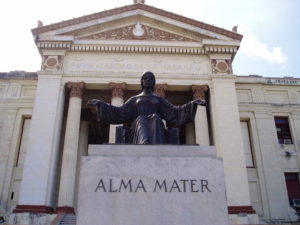Cuban Students Protest Embargo
On October 17, thousands of Cuban students assembled at the University of Havana to stage demonstrations denouncing the continued U.S. embargo against their country. Josefina Vidal, head of the Cuban Foreign Ministry Department specializing in Cuban-U.S. relations, appeared to spearhead the event. Vidal remarked that even after decades of stalled progress on the repeal of the embargo, she believes that in the present day, the complete restoration of U.S.-Cuban relations is still possible. The student protest at the University of Havana comes amidst President Obama’s recent initiatives to close the large rift between the U.S. and Cuba. Under the Obama administration, airline companies can now
offer direct flights to the Caribbean nation from the U.S., and a recent measure now permits tourists travelling to Cuba to bring back unrestricted amounts of Cuban rum and cigars. Although these measures are significant events in the rapprochement between both countries, more challenges await: the United States has yet to fully dismantle the embargo.
A day after the student protest, the U.S. Speaker of the House, Paul Ryan, declared his support for retaining the embargo. According to Europa Press, Ryan stated in a press conference that détente between the United States and Cuba has “emboldened the regime at the expense of the Cuban people.” Furthermore, according to Reuters, Ryan reproached Obama’s conciliatory policies toward the Cuban government, deeming them as “efforts to appease the oppressive regime.”

Paul Ryan’s declarations perturb both Cubans and U.S. citizens in favor of the embargo’s dissolution. Ryan, alongside two prominent Cuban-American Republican congressmen, Senator Marco Rubio and Rep. Ileana Ros-Lehtinen, lead factions embargo supporters in the House of Representatives and the Senate. President Obama’s successor in the presidency will be forced to contend with resistant elements in Congress and face further legislative obstructions in regards to US-Cuban relations.
Cuban citizens have expressed outrage at the embargo, and have taken to social media to vent their frustration. As a result, the hashtag #YoVotoVsBloqueo (“I vote against the embargo”) emerged on the social media scene, encapsulating the frustration of many Cubans.
While most Cubans lament the economic restrictions of the embargo, one Cuban, Iroel Sanchez, tweeted, “I’m voting against the blockade because the U.S. only wants to protect the rights of those Cubans who serve its interests.” Sanchez’s tweet criticizes the influence of pro-embargo Cuban-Americans on US policy toward Cuba, which reveals another significant factor obstructing full U.S.-Cuban rapprochement.
The recent protest by Cuban students shows deeply entrenched resentments, particularly among younger segments of Cuba’s population, toward a historical dispute that has affected their country economically since the Cuban Missile Crisis. Furthermore, the protests indicate that a new Cuban generation seeks to reestablish ties with the United States and end decades of isolation.
Until the next United States president can approach the U.S.-Cuban relations issue, a deadlock between the opposing factions over the embargo will likely remain. Until then, Cubans are resigned to endure the embargo and its consequences on all aspects of their lives.
